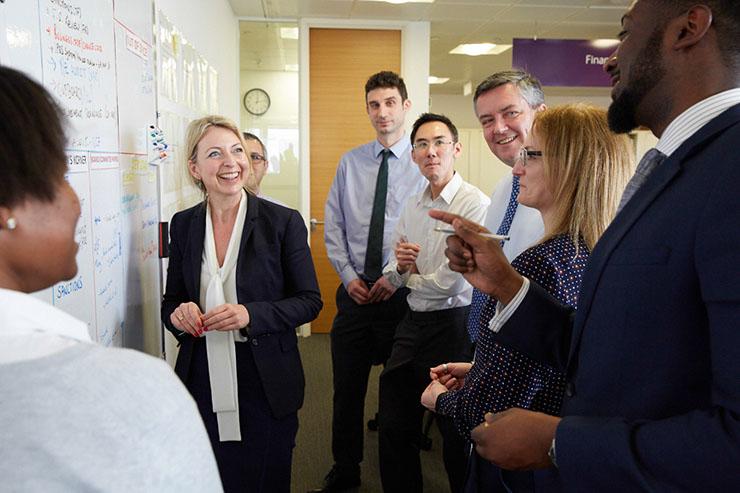
The FSCS protects customers when authorised financial services firms fail, providing a safeguard for the public who maybe left in arrears because of a financial organisation having ceased trading or been declared in default.
FSCS has undergone a significant workplace transformation, employing around 250 staff across two sites in Gloucestershire and Glasgow, the business also relies on a network of trusted outsourced partners to support with service delivery, in the event of a financial organisation struggling, capacity could need to flex to support up to 400 staff. FSCS needed to reimagine its workspace and culture, moving away from fixed desks and tower computers, to embracing a ‘work anywhere’ culture and encouraging collaboration.
The Challenge
 A reliance on desktop computers across the office resulted in employees feeling ‘shackled’ to their desks in order to complete work. It wasn’t just within the office space this was the case, meeting rooms also had their own tower computer to connect to presentation equipment. This typically resulted in up-to 75 working hours lost every week due to loading up the machines, accessing files and setting up individual applications and presentations for every meeting.*
A reliance on desktop computers across the office resulted in employees feeling ‘shackled’ to their desks in order to complete work. It wasn’t just within the office space this was the case, meeting rooms also had their own tower computer to connect to presentation equipment. This typically resulted in up-to 75 working hours lost every week due to loading up the machines, accessing files and setting up individual applications and presentations for every meeting.*
Aging software. A lack of speed. Outdated technology. All of these challenges were becoming far too familiar, and productivity was in decline. The company culture wasn’t geared towards collaboration – with stronger relationships required between its two branches, and with outsource partners. The business knew the status quo
wasn’t sustainable. It was time for change.
FSCS’ IT team developed a three-pronged transformation to deliver the change that was required:
1. PORTABILITY: provide an entire device refresh for all employees
2. MOBILITY: deploy a dedicated virtual private network (VPN) for employee access
3. COLLABORATION: invest in cloud-based applications to take the onus away from on-premises deployments
The company invested in providing every employee with an HP X360 laptop, replacing legacy desktop computers. This change immediately unleashed employees from their desks, enabling hot-desking across the site and taking a giant stride towards the ‘work anywhere’ culture.
However, simply deploying laptops isn’t the silver bullet for mobile working. To create a comfortable, productive hot-desk equipment such as monitor(s), keyboards and mice are required. FSCS anticipated find a docking station to connect all these peripherals would be simple, believing the laptop required the bulk of consideration and investment.
"The importance of the docking station was grossly underestimated, the laptops made an immediate impact, but we needed a connectivity solution that could manage the setup for every employee’s desk, something that was device agnostic for future investments, as well."
Darren Martyn – IT support manager at FSCS
The Solution
 Working with Targus throughout project from assessment to deployment, FSCS noted the genuine interest the team had in delivering a successful implementation and helping them overcome their challenges. Issuing more than 300 Targus DOCK180’s across its Gloucestershire site the roll-out underpinned the organisation’s move from a fixed desk department to a cloud-enabled agile working environment.
Working with Targus throughout project from assessment to deployment, FSCS noted the genuine interest the team had in delivering a successful implementation and helping them overcome their challenges. Issuing more than 300 Targus DOCK180’s across its Gloucestershire site the roll-out underpinned the organisation’s move from a fixed desk department to a cloud-enabled agile working environment.
"Excellent compatibility, it just worked out of the box."
"Due to the fast-paced nature of the financial industry, it’s critical we can jump into action if any bank or FCA registered firm needs support, especially with Brexit still looming. Thanks to the increase we’ve seen in collaboration, we can be confident in our ability to remain agile and scale up quickly" continued Martyn.
The Results
The roll-out has clearly made a significant impact on FSCS’ working culture, but also immediately delivered return in terms of productivity gains. “In the six months or so since deployment, we’re already seeing evidence of stronger partner relationships as well. All of this has been underpinned by technology,” Martyn added.
With employees now able to bring devices to meetings - rather than hand-outs - FSCS has also seen a marked decrease in the requirement for printing, with paper usage quickly declining. This reduction in paper will be a continued focus for FSCS, as it seeks to become a more environmentally friendly organisation.
“You wouldn’t necessarily associate docking stations with such significant productivity gains - and reduced environmental impact from an organisation - but that’s exactly the impact the technology has made,” Martyn said. “The importance of finding the right dock was grossly underestimated and we were really struggling to find a docking solution to meet our connectivity needs. When we were at a crisis point and preparing to deliver bad news to the business, Targus came in, helped us through the deployment and instilled confidence in the potential of the solution. That optimism and genuine interest in the project has already delivered tangible results for us and we couldn’t ask for more from a supplier.”
Download full PDF version of the case study - click here